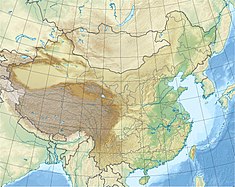Sup'ung Dam
| Sup'ung Dam | |
|---|---|
 |
|
|
Location of Sup'ung Dam in China
|
|
| Country | China/North Korea |
| Location | Liaoning Province/North Pyongan. |
| Coordinates | 40°27′43″N 124°57′45″E / 40.46194°N 124.96250°ECoordinates: 40°27′43″N 124°57′45″E / 40.46194°N 124.96250°E |
| Status | Operational |
| Construction began | 1937 |
| Opening date | 1943 |
| Dam and spillways | |
| Type of dam | Gravity |
| Height | 106 m (348 ft) |
| Length | 899.5 m (2,951 ft) |
| Elevation at crest | 126.4 m (415 ft) |
| Spillway type | Main: 26 x sluice gates Auxiliary: 16 x sluice gates |
| Spillway capacity | Main: 37,650 m3/s (1,329,597 cu ft/s) Auxiliary: 17,046 m3/s (601,974 cu ft/s) |
| Reservoir | |
| Creates | Sapung Lake |
| Total capacity | 14,600,000,000 m3 (11,836,413 acre·ft) |
| Active capacity | 7,900,000,000 m3 (6,404,634 acre·ft) |
| Inactive capacity | 4,180,000,000 m3 (3,388,781 acre·ft) |
| Catchment area | 52,912 km2 (20,429 sq mi) |
| Surface area | 274 km2 (106 sq mi) |
| Normal elevation | 123 m (404 ft) |
| Power station | |
| Operator(s) | Korea-China Hydroelectric Co |
| Commission date | 1941 |
| Hydraulic head | 77 m (253 ft) |
| Turbines | 6 x 105 MW Francis-type 2 x 67.5 MW Francis-type |
| Installed capacity | 765 MW |
The Sup'ung Dam (Chinese:水丰水库/水豐水庫, Korean: 수풍댐), also referred to as the Shuifeng Dam and previously the Sui-ho Dam, is a gravity dam on the Yalu River between Kuandian Manchu Autonomous County, Liaoning Province in China and Sakju County, North Pyongan Province in North Korea. The dam was constructed by the Japanese between 1937 and 1943 in order to generate electricity and has been repaired and renovated several times throughout the years, mainly due to spillway damage from flooding.
During the Korean War, the dam was bombed by the United Nations Command three separate times in order to disrupt power generation for the North Koreans. At the time of its completion, the dam was the largest in Asia, and power station was third-largest (after Hoover Dam and Wilson Dam) hydroelectric power station in the world. It is still the largest hydroelectric power station on the Yalu River. Power produced at the dam's main 630 MW power station is evenly shared between China and North Korea.
The dam is featured on the national emblem of North Korea.
In 1937, during Japan's colonization of Korea, the Yalu Hydroelectric Company was established and in the same year construction began on the dam. In 1941, the dam was complete and two of the 100 MW generators were operational. Four more generators were later operational in 1943. The seventh generator was German-made and not delivered due to shipping difficulties during World War II. At the time of its completion, the dam was the largest in Asia and second largest in the world. Power from the dam was used throughout the Korean peninsula and southern Manchuria (Manchukuo at the time). After World War II, in 1947, the Soviet Union occupied the area, and dismantled and carried three of the seven generators to the Irtysh River dam in Kazakhstan. They would later be re-installed during the 1950s.
...
Wikipedia

